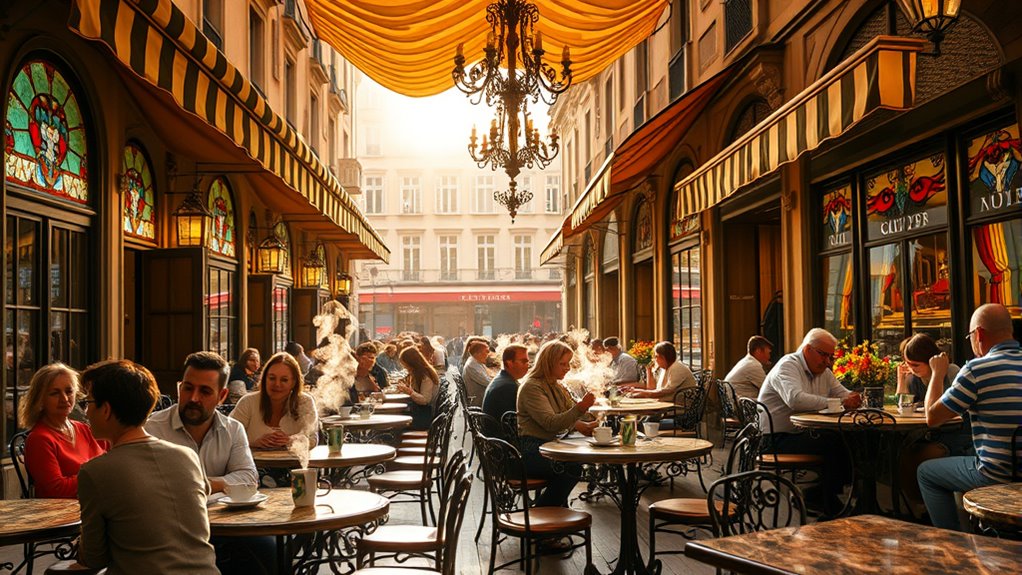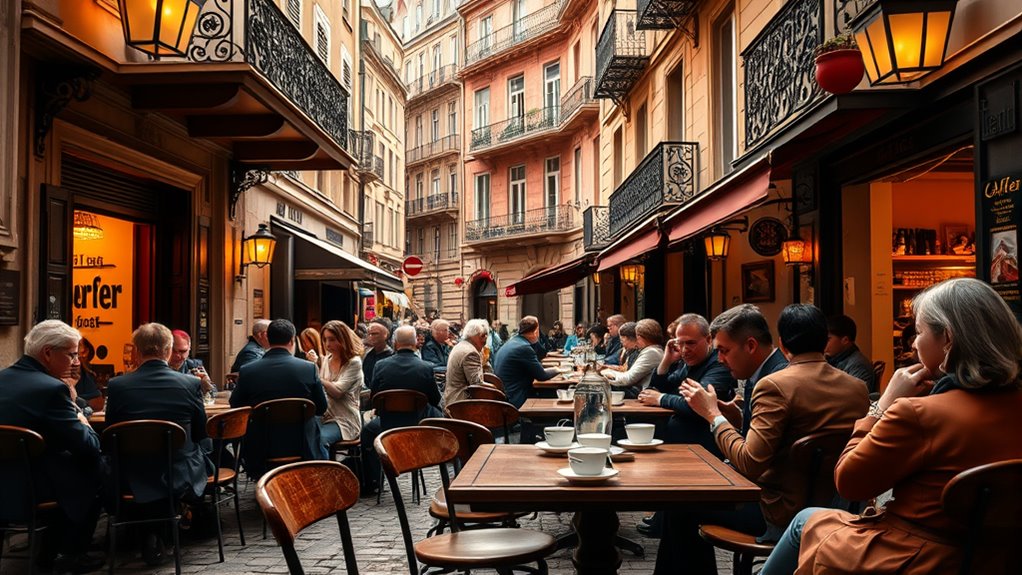When coffee arrives in Europe, it sparks a social and intellectual revolution. Coffeehouses become lively spots for debate, science, and politics, fueling ideas that shape the Enlightenment. These cafés break down social barriers and encourage diverse conversations, inspiring revolutionary thoughts and societal change. If you explore further, you’ll discover how coffee’s cultural spread turned it into a catalyst for modern ideas and movements across Europe.
Key Takeaways
- Arab traders introduced coffee to Europe through Mediterranean ports, facilitating cultural exchange and trade routes.
- Coffeehouses emerged as centers for social and intellectual discussions, fueling the European Enlightenment.
- These cafés democratized knowledge, engaging diverse social classes and promoting progressive ideas.
- Coffee’s energizing effects encouraged social interaction, dialogue, and revolutionary thinking across European cities.
- The spread of coffee and cafés contributed significantly to societal and intellectual revolutions in Europe.

Coffee finally arrived in Europe, transforming social life and daily routines across the continent. This shift didn’t happen overnight but was the result of centuries of Arabian trade, where Arab merchants carried coffee from its origins in Yemen and Ethiopia through a complex web of routes. As traders exchanged goods and ideas, coffee made its way into the Mediterranean and beyond, bringing with it a wave of cultural diffusion. You can think of it as more than just a drink—coffee became a vessel for ideas, conversation, and social change, spreading through ports and cities that connected different worlds. The Arab traders, who guarded coffee’s secrets for centuries, played an essential role in its dissemination, ensuring that the beverage’s popularity would grow beyond the Middle East. The development of specialized trade routes facilitated the widespread distribution of coffee, making it accessible across Europe and other regions. This expansion was further supported by the establishment of coffeehouses, which became key venues for the exchange of revolutionary ideas and ideas of progress.
Once coffee reached Europe, it quickly became intertwined with the continent’s cultural fabric. Coffeehouses emerged as lively hubs of intellectual exchange, where people from various walks of life gathered to debate politics, philosophy, and science. These cafés didn’t just serve as places to sip a stimulating brew; they became breeding grounds for new ideas, fostering the European Enlightenment. You’d find writers, scientists, artists, and thinkers sharing thoughts over steaming cups, challenging old notions and sparking revolutionary movements. The social diffusion of coffee also influenced daily routines—people replaced their traditional tea or ale with this new energizer, altering the rhythm of their days and encouraging more social interaction. The proliferation of coffeehouses helped democratize knowledge, allowing diverse social classes to engage in lively discussions.
The spread of coffee through these cultural channels helped reshape European society, fueling curiosity and innovation. As coffeehouses multiplied across cities like London, Paris, and Vienna, they became symbols of modernity and progress. You might have noticed that these places often had a distinctive atmosphere—lively, inclusive, and spirited—encouraging dialogue among diverse groups. Coffee’s arrival marked a turning point, not just in how people stayed awake but in how they connected, thought, and challenged the status quo. Through the process of cultural diffusion driven by Arabian trade routes, coffee shifted from a regional specialty to a potent catalyst for social and intellectual revolution across Europe.
Frequently Asked Questions
How Did Coffee Influence European Social Structures?
You see that coffee markedly influenced European social structures by prompting social class shifts and transforming gender dynamics. Coffeehouses became social hubs where different classes mingled, breaking down traditional barriers. Women gained more visibility and influence in these spaces, altering gender roles. As a result, coffee fostered more egalitarian interactions and contributed to the development of public discourse, shaping modern social and cultural norms across Europe.
What Were the Initial European Reactions to Coffee’S Introduction?
You might be surprised, but when coffee first arrived in Europe, reactions varied widely. Some embraced it quickly, driven by cultural acceptance and curiosity, while others faced religious opposition, viewing it with suspicion or disdain. Initially, coffee’s social gatherings challenged traditional norms, sparking debates. Despite resistance, its stimulating effects and lively cafés helped it gain popularity, gradually transforming social and cultural landscapes across Europe.
Which European Countries Adopted Coffee the Fastest?
You notice that the Dutch and French adopted coffee the fastest, driven by their thriving coffee trade and enthusiastic for cultural adaptation. The Netherlands quickly embraced coffeehouses, becoming major hubs for social and intellectual exchange. France followed suit, integrating coffee into its vibrant café culture. Their swift adoption reflects their active trade networks and openness to new cultural practices, positioning them as early coffee enthusiasts in Europe.
How Did Coffeehouses Contribute to Political Discourse?
You see, coffeehouses played a key role in fostering political discourse by becoming lively spaces for discussion. They often hosted literary salons and encouraged political activism, allowing ideas to spread rapidly. As you visit these venues, you realize how they became hubs for exchanging revolutionary thoughts, shaping public opinion, and even influencing political change. Their vibrant atmosphere empowered individuals to challenge the status quo and participate actively in societal debates.
Were There Any Health Concerns Associated With Coffee Consumption?
Did you know that in the 17th century, some people worried about coffee’s health effects? As coffee consumption grew, concerns about potential health effects like insomnia or increased heart rate emerged. While moderate drinking is now considered safe, historically, many questioned whether coffee was good for you. These consumption concerns highlight how society once debated coffee’s impact, but today, research shows it can have positive health benefits when enjoyed responsibly.
Conclusion
As you’ve seen, coffee’s arrival in Europe sparked more than just a caffeine boost; it ignited minds and fueled revolutions. It’s clear that this humble beverage changed the course of history, proving that sometimes, the smallest things can make the biggest impact. Remember, it’s often the quietest waves that cause the biggest ripples, so never underestimate the power of a simple cup of coffee to spark change and inspire new ideas.









